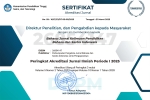Folk Taxonomy of Fish in Kaera Language
Abstract
This paper describes ethnosemantic system of fish classification in Kaera Language, a papuan language spoken in East Pantar, Alor Regency, East Nusa Tenggara, Indonesia. The aims of this study are to document vernacular names of fish in Kaera Language, to classify them using folk taxonomy proposed by Berlin (1992), and to describe the fish naming system in Kaera community. The data were collected by employing quasi-experimental method, resulting in 63 terms of fish in Kaera language. The data were then transcribed and classified based on their taxa in folk taxonomy (Berlin, 1992). The result of data analysis showed that fish in Kaera Language are classified into four levels of taxonomy hierarchy namely unique beginner, life form, generic and specific. While regarding folk nomenclature, Kaera community name the fish by their appearance, habitat, and imagination, reflecting their cultural perspective that is influenced by nature around them.
Abstrak
Makalah ini mendeskripsikan sistem pengklasifikasian ikan secara etnosemantik dalam bahasa Kaera, bahasa yang termasuk rumpun bahasa papua, dituturkan oleh masyarakat Pantar Timur, Kabupaten Alor, Provinsi Nusa Tenggara Timur. Tujuan penulisan makalah ini adalah untuk mendokumentasikan nama-nama ikan dalam bahasa Kaera, mengklasifikasikannya berdasarkan taksonomi daerah yang diusulkan oleh Berlin (1992), dan mendeskripsikan sistem penamaannya dalam masyarakat Kaera. Data dalam kajian ini dikumpulkan menggunakan metode kuasi-eksperimen, menghasilkan 63 istilah ikan dalam bahasa Kaera. Data yang terkumpul kemudian ditranskripsi dan diklasifikasikan berdasarkan taksa dalam taksonomi rakyat (Berlin, 1992). Hasil kajian ini menunjukkan bahwa ikan dalam bahasa Kaera diklasifikasikan ke dalam empat level hirarki taksonomi, yakni unique beginner, life form, generic, dan specific. Sementara itu, berkaitan dengan nomenklatur, masyarakat Kaera menamai ikan berdasarkan tampilan, habitat, dan imajinari, merefleksikan perspektif budaya masyarakat Kaera yang dipengaruhi oleh alam di sekitar mereka.
Keywords
Full Text:
PDFReferences
(ELP), E. L. P. (n.d.). Kaera Language Metadata. Retrieved 2 June 2022 from e ndarangeredlanguage.com
Berlin, B. (1992). Ethnobiological Classification Principles of Categorization of Plants and Animals in Traditional Society. Princeton University Press.
https://doi.org/10.1515/9781400862597
Berlin, B. (2006). The first congress of ethnozoological nomenclature. Journal of the Royal Anthropological Institute, 12, S23-S44.
https://doi.org/10.1111/j.1467-9655.2006.00271.x
Ellen, R. (1993). The Cultural Relations of Classification: An Analysis of Nuaulu animal categories from central Seram (E. Gellner, J. Goody, S. Gudeman, M. Herzfeld, & J. Parry, Eds.). Cambridge University Press.
https://doi.org/10.1017/CBO9780511470530
Frake, C. O. (1961). The Diagnosis of Disease among the Subanun of Mindanao. American Anthropologist, 63(1), 113-132. http://www.jstor.org/stable/667341
https://doi.org/10.1525/aa.1961.63.1.02a00070
Hamill, J., Sidky, H., & Subedi, J. (2002). Birds for Words in Jirel: Structure and Function in a Tibeto-Burman Folk Taxonomy. Anthropological linguistics, 44(1), 65-84. https://go.exlibris.link/hl8Tljk6
Hengsuwan, M., & Prasithrathsint, A. (2014). A Folk Taxonomy of Terms for Ghosts and Spirits in Thai. MANUSYA, 17;2014;(2), 29-49. https://doi.org/10.1163/26659077-01702003
Kadarisman, A. E., & Williams, R. (2009). The "Language is a Mirror" metaphor and its implications on foreign language teaching. Mengurai Bahasa Menyibak Budaya, 172-198.
Klamer, M. (2016). Abangiwang Kaera field notes. https://lexirumah.model-ling.eu/sources/klamer16-kaera
Klamer, M. (2017). The Alor-Pantar languages: History and typology. Second edition. Language Science Press. https://doi.org/10.5281/zenodo.437098
Kutuzova, N. S. (2020). Semantical Meanings of Colours in Chinese Culture. In Proceeding of the International Science and Technology Conference "FarEastСon 2019" (pp. 445-453). Springer Singapore. https://doi.org/10.1007/978-981-15-2244-4_42
Leo, H. Y., Weking, C. T., Tamelab, B., & Puling, A. T. (2019). Kosakata Kaera-Indonesia. In Kosakata Kaera-Indonesia.
NTT, T. P. K. B. (2021). Kosakata Kaera-Indonesia (Edisi Revisi). In Kosakata Kaera-Indonesia (Edisi Revisi).
Phaka, F. M., Netherlands, E. C., Kruger, D. J., & Du Preez, L. H. (2019). Folk taxonomy and indigenous names for frogs in Zululand, South Africa. Journal of ethnobiology and ethnomedicine, 15(1), 1-8.
https://doi.org/10.1186/s13002-019-0294-3
Worojie, T. B., Asfaw, B. T., & Mengesha, W. A. (2021). Indigenous biosystematics of yams (Dioscorea spp.) in Southwest Ethiopia: folk taxonomy, ethnolinguistic analysis, and folk descriptors. Journal of ethnobiology and ethnomedicine, 17(1), 1-1. https://doi.org/10.1186/s13002-020-00427-8
DOI: https://doi.org/10.26499/bahasa.v4i2.281
Refbacks
- There are currently no refbacks.

This work is licensed under a Creative Commons Attribution-NonCommercial-ShareAlike 4.0 International License.
This work is licensed under a Creative Commons Attribution-ShareAlike 4.0 International License.
Apartemen Suite Metro
Jalan Soekarno Hatta No. 698B, Kelurahan Jatisari - Kecamatan Buahbatu Bandung, Jawa Barat 40286

























